Do Chinchillas Hide Their Illnesses? Understanding Their Behavior

Do Chinchillas Hide Their Illnesses?
Yes, chinchillas are skilled at concealing signs of illness, making it difficult for owners to notice potential health issues.
Understanding their behavior is crucial for early detection and prompt veterinary care.
Chinchillas’ Instinctual Behavior
Chinchillas instinctively exhibit a range of behaviors essential for their survival in the wild. These natural instincts include grooming, dust bathing, and gnawing on objects to keep their teeth healthy and trimmed. Despite their cute appearance, chinchillas are prey animals, so they’re naturally cautious and may startle easily. This heightened sense of awareness helps them detect potential threats in their environment, allowing them to escape from danger quickly.
One common misconception about chinchillas is that they don’t need social interaction. In reality, these animals are social creatures that thrive in the company of other chinchillas. In the wild, they live in colonies, so it’s important to provide them with companionship to ensure their well-being. Understanding and respecting their natural instincts is crucial for providing proper care and creating a stimulating environment for these fascinating creatures.
Signs of Concealed Illness
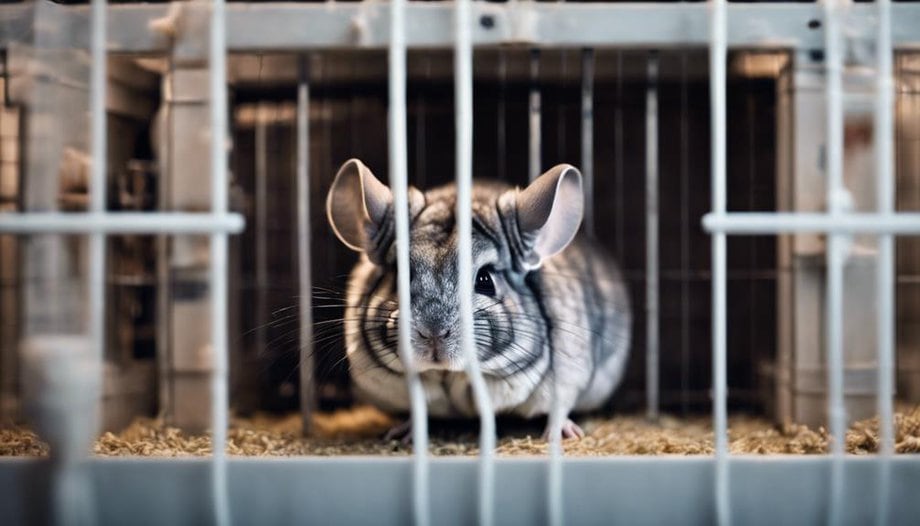
Early detection of illness in chinchillas can be challenging due to their ability to conceal signs of sickness. Chinchillas are masters at hiding symptoms of illness as a survival instinct, making it crucial for owners to be vigilant. Some hidden symptoms of concealed illness in chinchillas include changes in behavior such as increased aggression, decreased social interaction, or sudden lethargy. Other concealed signs may manifest as subtle changes in appetite, grooming habits, or vocalizations. Owners should pay close attention to any irregularities in their chinchilla’s daily routine, as these could be early indicators of an underlying health issue.
Regular health check-ups by a veterinarian are essential for detecting concealed signs of illness in chinchillas, as professionals may notice subtle changes that are easily overlooked by owners. Additionally, being familiar with your chinchilla’s typical behavior and habits can help in identifying deviations that may signal a health problem. By staying alert and proactive, owners can ensure the well-being of their chinchillas and address any concealed illnesses promptly.
Understanding Chinchilla Body Language
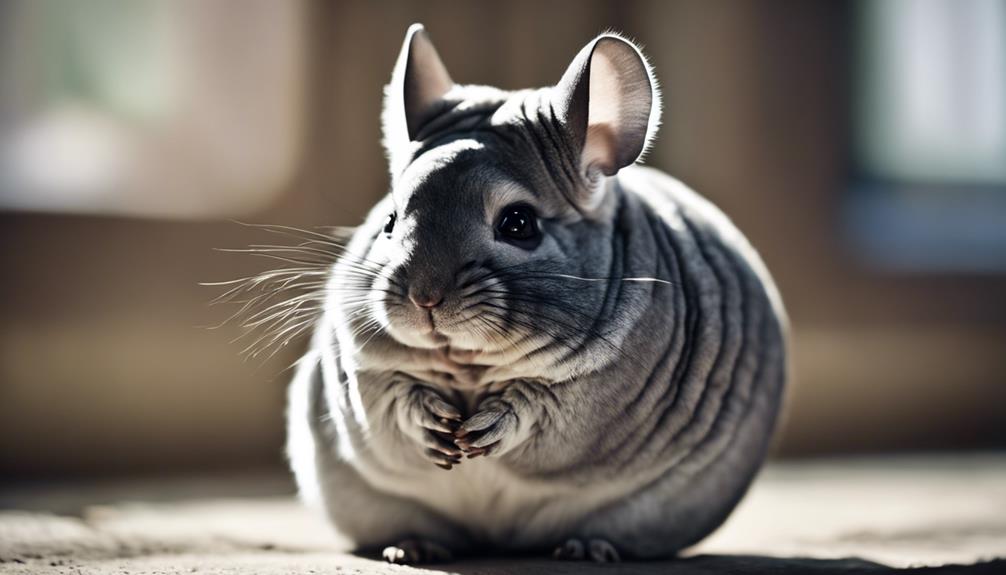
Chinchillas communicate through various body language cues such as tail wagging, ear positions, and teeth grinding, providing important insights into their emotions and well-being. Understanding the meaning behind these behaviors can help chinchilla owners better care for their pets and recognize any signs of discomfort or distress.
Tail Wagging Meaning
When a chinchilla wags its tail, it’s a key indicator of its emotional state and communication with others in its environment. Tail flicking can be a sign of stress in chinchillas, showing that they may be anxious or feeling threatened.
On the other hand, tail thumping serves as a form of communication signals among chinchillas. By observing the frequency and intensity of the tail wagging, chinchilla owners can better understand their pets’ feelings and reactions to different situations.
It’s essential to pay attention to these subtle body language cues to ensure the well-being and comfort of chinchillas in their environment. Understanding the meaning behind tail movements can help strengthen the bond between chinchilla and owner.
Ear Position Signals
A chinchilla’s ear position serves as a crucial indicator of its mood and intentions, providing valuable insights into their communication and emotional state. These small rodents have highly sensitive ears, allowing them to pick up even the slightest of sounds. Understanding a chinchilla’s ear movements can help in deciphering their feelings and needs. In social interactions, ear positions play a significant role in signaling their willingness to engage or indicating discomfort. Here is a table summarizing the different ear positions and their meanings:
| Ear Position | Meaning |
|---|---|
| Perked Up | Alertness and curiosity |
| Flat Against Head | Fear or discomfort |
| Rotated Backwards | Aggression or annoyance |
| One Up, One Down | Uncertainty or wariness |
| Twitching | Nervousness or agitation |
Teeth Grinding Indication
Indicating discomfort or pain, teeth grinding in chinchillas is a crucial aspect of their body language, revealing important cues about their well-being and emotions. Chinchillas may grind their teeth as pain indicators, signaling potential dental issues, discomfort, or stress. This abnormal behavior shouldn’t be overlooked, as it could indicate a serious underlying problem that requires attention from a veterinarian.
Owners should observe their chinchilla’s behavior closely, noting any changes in eating habits or weight loss alongside teeth grinding. Providing a comfortable and stress-free environment for the chinchilla is essential to prevent such behaviors. Regular veterinary check-ups and proper dental care can help in detecting and addressing any dental problems early, ensuring the chinchilla’s well-being and happiness.
Challenges in Detecting Illnesses
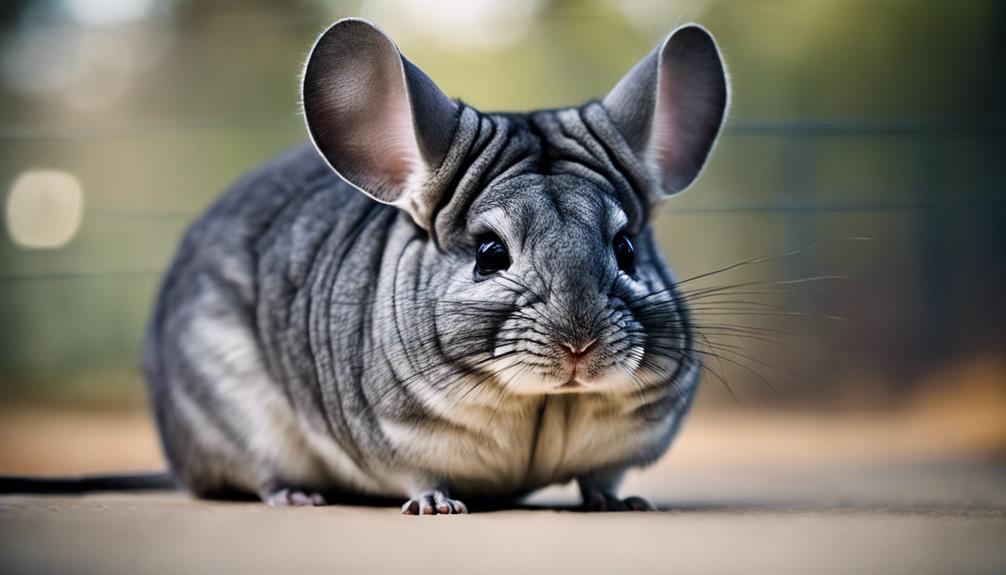
Detecting illnesses in chinchillas can be challenging due to their subtle behavior patterns, which can easily be misinterpreted. Owners must be vigilant and observant to spot any signs of silent suffering that these small creatures may exhibit.
Understanding the nuances of chinchilla behavior and recognizing the early symptoms of illness can be crucial in providing timely veterinary care.
Chinchilla Behavior Patterns
Understanding chinchilla behavior patterns presents challenges in identifying potential illnesses due to their subtle nature. Chinchillas engage in social grooming as a way to bond and maintain social harmony within their group. This behavior involves gently nibbling and cleaning each other’s fur.
Playful interactions, such as hopping around and chasing one another, are common among chinchillas and serve as a form of exercise and entertainment. However, these behaviors can make it difficult for owners to distinguish between normal activities and signs of distress or illness.
Chinchillas are masters at masking symptoms, making it crucial for owners to closely monitor any deviations from their usual behavior to catch illnesses early and ensure prompt veterinary care.
Misinterpretation of Symptoms
Navigating the complexities of chinchilla behavior can pose challenges for owners in recognizing the subtle indicators of potential illnesses. Symptom misinterpretation and concealed illnesses are common issues that lead to chinchillas silently suffering without timely intervention. To address this, owners should prioritize routine checks to catch any signs of illness early on.
- Chinchillas are masters at hiding discomfort.
- Signs of illness may be subtle and easily missed.
- Regular health assessments are essential for early detection.
- Professional veterinary advice is crucial when in doubt.
Silent Suffering Signs
Recognizing signs of silent suffering in chinchillas requires keen observation and a deep understanding of their subtle behavioral cues. Chinchillas are masters at masking discomfort, often exhibiting subtle symptoms that can easily be overlooked.
Owners must remain vigilant for underestimated conditions and hidden ailments that these small creatures may be experiencing. Signs such as decreased activity levels, changes in eating habits, excessive grooming, or a hunched posture can indicate underlying health issues.
Importance of Routine Health Checks
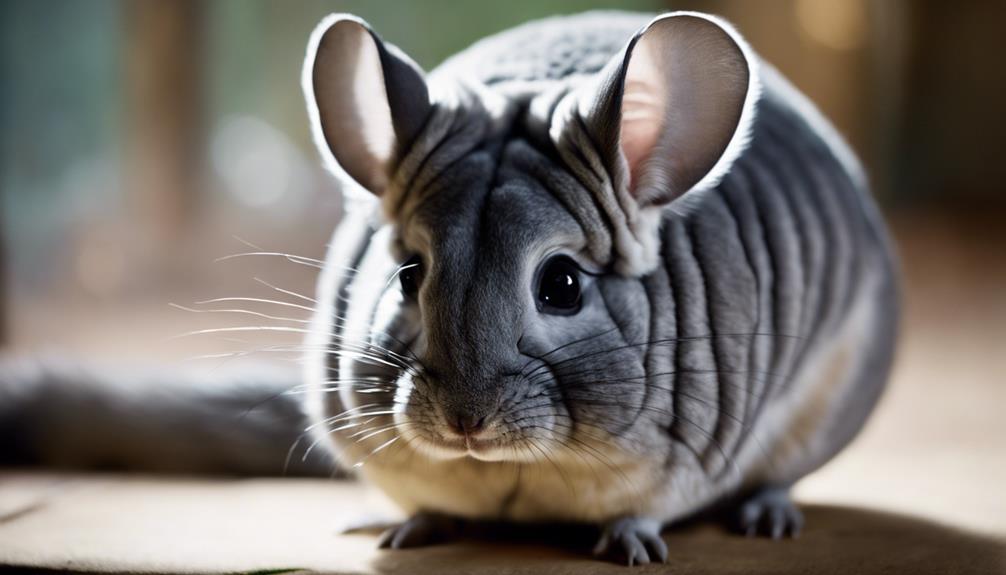
Regular health checks play a crucial role in maintaining the well-being of your chinchilla. These routine check-ups are essential for preventive care and early detection of any potential health issues. Here are four key reasons why regular health checks are important for your furry friend:
- Preventive Care: Regular health checks help in identifying any underlying health concerns before they escalate into more serious problems.
- Early Detection: By visiting the vet regularly, you increase the likelihood of detecting any illnesses or abnormalities in the early stages when they’re more manageable.
- Professional Advice: Veterinarians can provide valuable guidance on chinchilla care, diet, and behavior during routine check-ups.
- Monitoring Overall Health: Routine health checks allow for the monitoring of your chinchilla’s weight, dental health, fur condition, and overall well-being.
Creating a Safe Environment

To ensure the well-being of your chinchilla, it is imperative to establish a safe and secure environment within their living space. Health precautions and preventive measures play a vital role in maintaining a healthy and happy chinchilla. Here are some key aspects to consider when creating a safe environment for your furry friend:
| Aspect | Description | Importance |
|---|---|---|
| Cage Size | Provide a spacious cage for exercise | Allows for movement |
| Bedding Material | Choose safe bedding to prevent respiratory issues | Promotes respiratory health |
| Toy Variety | Offer a variety of toys for mental stimulation | Prevents boredom |
Ensuring the cage size is adequate allows for exercise, which is crucial for a chinchilla’s health. Selecting safe bedding materials is essential to prevent respiratory problems, a common issue in chinchillas. Offering a variety of toys helps in mental stimulation, preventing boredom and promoting overall well-being. By implementing these measures, you create a safe environment that fosters your chinchilla’s health and happiness.
Seeking Veterinary Assistance
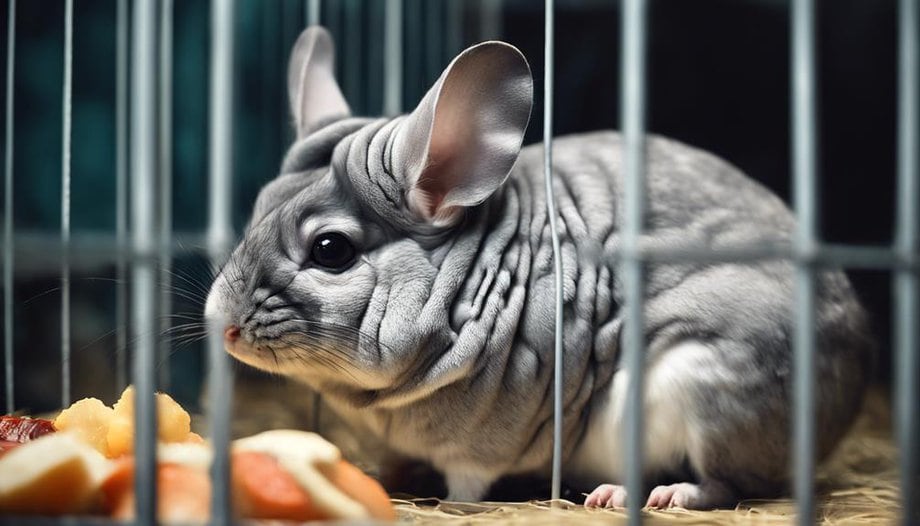
Seeking veterinary assistance is essential for promptly addressing any health concerns that may arise with your chinchilla. Early detection of illnesses or abnormalities can significantly impact the outcome of treatment and the overall well-being of your furry friend. Regular vet visits are crucial to monitor your chinchilla’s health status and catch any potential issues before they escalate.
Here are some key points to consider when seeking veterinary assistance for your chinchilla:
- Regular Check-ups: Schedule routine check-ups with a specialized exotics veterinarian to ensure your chinchilla’s health is consistently monitored.
- Prompt Action: If you notice any changes in behavior, appetite, or activity levels, seek veterinary assistance promptly to address any potential health issues.
- Diagnostic Tests: Be open to diagnostic tests recommended by your vet to accurately identify any underlying health conditions.
- Medication Compliance: Follow your vet’s instructions diligently regarding medications, treatments, and follow-up care to ensure your chinchilla’s recovery.
Frequently Asked Questions
Can Chinchillas Experience Stress or Anxiety That May Mimic Symptoms of Illness?
When under stress, chinchillas may exhibit behavioral changes that mimic illness. Anxiety can manifest as symptoms, such as decreased appetite or excessive grooming. Observing closely for these signs can help differentiate between stress-induced behaviors and actual sickness.
How Often Should I Schedule Routine Health Checks for My Chinchilla?
Regular routine check-ups are vital for chinchilla health maintenance and prevention of potential issues. Scheduling these appointments with a knowledgeable vet ensures early detection of problems, promoting the well-being of these adorable pets.
Are There Any Specific Warning Signs That Indicate a Chinchilla Is in Immediate Need of Veterinary Assistance?
Behavioral changes like lethargy or loss of appetite and physical symptoms such as labored breathing or unusual posture can signal emergency situations. Prompt veterinary care is crucial when a chinchilla displays these warning signs.
Can Chinchillas Develop Chronic Illnesses That May Not Show Obvious Symptoms?
Chinchillas can develop chronic illnesses that may not show obvious symptoms, leading to silent suffering. These hidden ailments require vigilant observation and prompt veterinary care to ensure the well-being of these delicate creatures.
How Can Environmental Factors Impact a Chinchilla’s Overall Health and Well-Being?
Environmental factors can significantly impact a chinchilla’s health. Diet impacts their well-being, with a balanced diet crucial for overall health. Cage setup affects exercise and stress levels. Proper care in these areas promotes a healthy, happy chinchilla.











